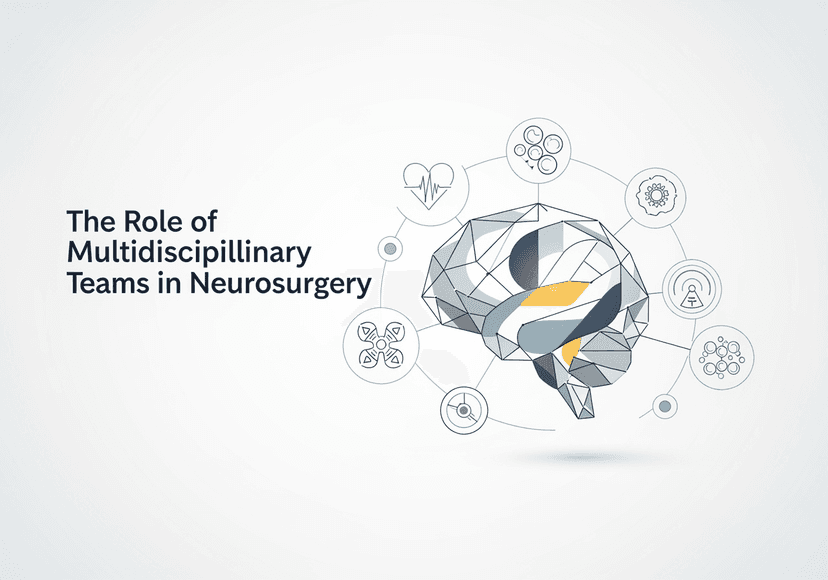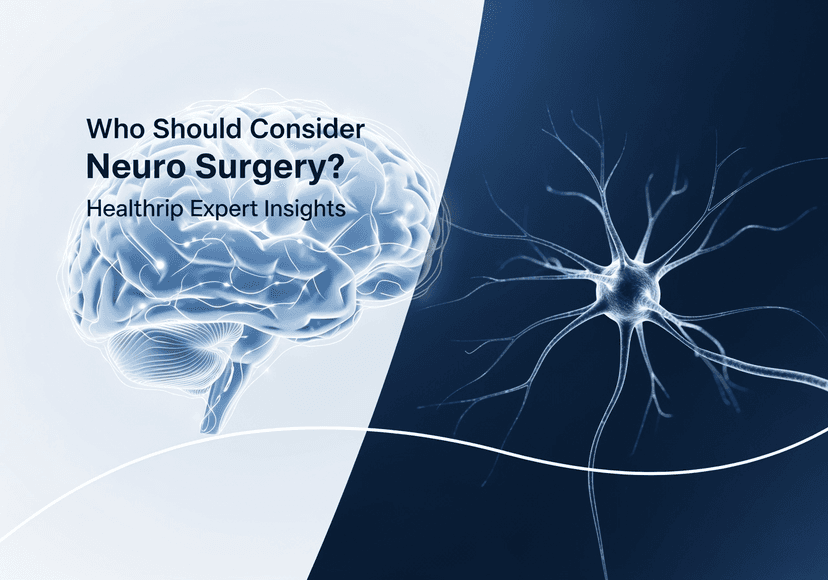
Is Spine Surgery Right for You? Healthtrip Explains Evaluation Steps
14 Oct, 2025
 Healthtrip
Healthtrip- Understanding Spine Surgery: When is it Considered?
- The Initial Consultation and Assessment: What to Expect
- Diagnostic Tests and Imaging: Pinpointing the Problem
- Exploring Non-Surgical Alternatives: Is Surgery the Only Option?
- Surgical Options and Hospital Choices: Tailoring Treatment to You
- Consider these Locations:
- Saudi German Hospital Alexandria, Egypt
- OCM Orthopädische Chirurgie München, Germany
- Fortis Escorts Heart Institute, Delhi, India
- Fortis Shalimar Bagh, Delhi, India
- QUIRONSALUD PROTON THERAPY CENTRE, Spain
- Quironsalud Hospital Toledo, Spain
- Yanhee International Hospital, Thailand
- Vejthani Hospital, Thailand
- Taoufik Clinic, Tunisia
- Memorial Bahçelievler Hospital, Istanbul, Turkey
- Memorial Sisli Hospital, Istanbul, Turkey
- NMC Specialty Hospital, Al Nahda, Dubai
- Thumbay Hospital, Dubai, UAE
- Hegde Hospital, India
- Saudi German Hospital Cairo, Egypt
- Helios Klinikum Erfurt, Germany
- Helios Emil von Behring, Germany
- Helios Klinikum München West, Germany
- Fortis Hospital, Noida, India
- Fortis Memorial Research Institute, Gurgaon, India
- Max Healthcare Saket, India
- Pantai Hospital Kuala Lumpur, Malaysia
- KPJ Ampang Puteri Specialist Hospital, Malaysia
- Dr. Hassan Al-Abdulla Medical Center, Qatar
- Saudi German Hospital Al-Madinah Almonawara, Saudi Arabia
- Saudi German Hospital Dammam, Saudi Arabia
- Saudi German Hospital Hail, Saudi Arabia
- Mount Elizabeth Hospital, Singapore
- Singapore General Hospital, Singapore
- National Cancer Centre Singapore, Singapore
- Jiménez Díaz Foundation University Hospital, Spain
- Hospital Quirónsalud Cáceres, Spain
- Quironsalud Hospital Murcia, Spain
- Bangkok Hospital, Thailand
- BNH Hospital, Thailand
- CGH Hospital, Thailand
- Taoufik Hospitals Group, Tunisia
- LIV Hospital, Istanbul, Turkey
- Hisar Intercontinental Hospital, Istanbul, Turkey
- NPISTANBUL Brain Hospital, Turkey
- NMC Royal Hospital, DIP, Dubai
- NMC Royal Hospital Sharjah, UAE
- NMC Specialty Hospital, Abu Dhabi, UAE
- London Medical, London, UK
- Cleveland Clinic London, UK
- The Royal Marsden Private Care, London, UK
- Consider these Locations:
- Understanding the Risks and Benefits of Spine Surgery
- Lifestyle Changes, Recovery, and Long-Term Expectations
- Making an Informed Decision: Is Spine Surgery Right for You?
Understanding Your Symptoms and Condition
Before even considering spine surgery, it's essential to fully understand the source and nature of your pain or discomfort. What activities trigger your symptoms? How long have you been experiencing these issues? Can you pinpoint the location of your pain? Keeping a detailed journal of your symptoms can provide valuable information for your doctor. Common conditions that might lead to the consideration of spine surgery include herniated discs, spinal stenosis (narrowing of the spinal canal), degenerative disc disease, scoliosis (curvature of the spine), and spondylolisthesis (slipping of one vertebra over another). Each of these conditions can present with varying symptoms, ranging from localized back pain to radiating pain, numbness, weakness, or even bowel and bladder dysfunction. It is important to take all of your symptoms into consideration, you can also consult with the medical professionals at hospitals like Saudi German Hospital Cairo, Egypt that provide comprehensive evaluations to help pinpoint the root cause of your spinal issues. Understanding your diagnosis is the first critical step in determining the most appropriate treatment plan, whether it ultimately includes surgery or not.
Most popular procedures in India
Non-Surgical Treatment Options
Before diving into the world of spine surgery, it's absolutely crucial to exhaust all appropriate non-surgical treatment options. Think of surgery as a last resort, the grand finale after you've tried everything else! These non-surgical approaches aim to alleviate pain, improve function, and potentially avoid the need for invasive procedures. Common non-surgical options include physical therapy, which can strengthen muscles, improve flexibility, and teach you proper posture and body mechanics. Pain management techniques, such as medication (over-the-counter or prescription), injections (epidural steroid injections or nerve blocks), and alternative therapies like acupuncture or chiropractic care, can also play a significant role in symptom relief. Lifestyle modifications, such as weight loss, smoking cessation, and regular exercise, can further contribute to overall spinal health. Your doctor may recommend a combination of these approaches, depending on your specific condition and symptoms. It's important to give these non-surgical treatments a fair chance, typically several weeks or months, to assess their effectiveness before considering surgery. Remember, avoiding the scalpel is always a win! Healthtrip can connect you with specialists at hospitals like Vejthani Hospital who can help you explore the best non-surgical options for your specific needs and support you through your treatment journey.
Imaging and Diagnostic Tests
If non-surgical treatments haven't provided sufficient relief, your doctor will likely recommend imaging and diagnostic tests to get a clearer picture of what's happening inside your spine. These tests help visualize the structures of your spine, identify any abnormalities, and pinpoint the source of your pain. Common imaging tests include X-rays, which can reveal bone structure and alignment; MRI (magnetic resonance imaging), which provides detailed images of soft tissues like discs, nerves, and ligaments; and CT scans (computed tomography), which offer cross-sectional views of the spine. Diagnostic tests, such as nerve conduction studies (NCS) and electromyography (EMG), can assess the function of your nerves and muscles, helping to identify nerve compression or damage. The results of these tests, combined with your medical history and physical examination, will provide your doctor with a comprehensive understanding of your spinal condition. This information is crucial for determining whether surgery is a viable option and, if so, what type of procedure would be most appropriate. You can rely on Healthtrip to find the best facilities for these tests like those at Fortis Hospital, Noida ensuring accurate results and expert interpretation.
Wellness Treatments
Give yourself the time to relax
Lowest Prices Guaranteed!

Lowest Prices Guaranteed!
Consultation with a Spine Surgeon
Armed with your medical history, physical examination findings, and imaging results, it's time to consult with a qualified spine surgeon. This consultation is a crucial step in determining whether surgery is the right choice for you. During the consultation, the surgeon will thoroughly review your case, discuss your symptoms and treatment goals, and explain the potential benefits and risks of surgery. Don't be afraid to ask questions! This is your opportunity to clarify any concerns you may have and ensure you fully understand the proposed procedure. The surgeon will also assess your overall health and fitness for surgery, considering factors such as age, weight, and any pre-existing medical conditions. They may also discuss alternative surgical approaches, such as minimally invasive techniques, which can offer potential benefits like smaller incisions, less pain, and faster recovery. The surgeon may be affiliated with hospitals like LIV Hospital, Istanbul and are available through Healthtrip’s network of professionals. Ultimately, the decision to proceed with surgery should be a collaborative one between you and your surgeon. Healthtrip can facilitate finding the right specialist.
Weighing the Benefits and Risks
Choosing to undergo spine surgery is a significant decision that requires careful consideration of both the potential benefits and risks. It's like weighing your options on a delicate scale, making sure you're fully informed before tipping the balance. The potential benefits of spine surgery can be substantial, including significant pain relief, improved function, and a better quality of life. For individuals with debilitating pain or neurological deficits, surgery can offer the chance to return to activities they once enjoyed. However, it's important to be aware of the potential risks, which can include infection, bleeding, nerve damage, blood clots, and complications related to anesthesia. In some cases, surgery may not provide complete pain relief, or symptoms may recur over time. It's also crucial to understand the recovery process, which can vary depending on the type of surgery and individual factors and typically involves physical therapy and rehabilitation, it could also depend on the medical facility opted for, such as BNH Hospital. Open and honest communication with your surgeon is essential to fully understand the potential benefits and risks of surgery in your specific case. Remember, there's no such thing as a guaranteed outcome, so it is important not to rely solely on the procedure, your dedication to post-operative care will also be important.
Considering Your Lifestyle and Goals
Beyond the medical aspects, it's vital to consider your lifestyle and personal goals when deciding about spine surgery. How will surgery impact your daily life, work, and hobbies? What are your expectations for recovery, and how realistic are they? Are you willing to commit to the necessary rehabilitation and lifestyle changes to maximize your chances of a successful outcome? Your overall health goals are something you should take into consideration too, maybe you are also looking to improve fertility at facilities like First Fertility Bishkek, Kyrgyzstan or need specialized cancer care in centers like National Cancer Centre Singapore both of these should be communicated to your doctors so you can assess if the surgery will help or hinder any of your goals. These are all important questions to ask yourself. If you're an athlete, for example, you might have different expectations and goals compared to someone who primarily works at a desk. It's also important to assess your support system. Having family members or friends who can provide emotional and practical support during your recovery can make a significant difference. Ultimately, the decision to undergo spine surgery should align with your values, priorities, and long-term goals. Healthtrip, in collaboration with facilities like Yanhee International Hospital, can help you factor in these lifestyle considerations to make the most informed decision.
Second Opinions and Informed Decision-Making
Deciding whether or not to undergo spine surgery is a big deal, and it's perfectly okay to seek a second opinion from another qualified spine surgeon or medical professional. Think of it as getting a fresh pair of eyes on your case, just to be absolutely sure you're making the right choice. A second opinion can provide additional insights, perspectives, and treatment options that you may not have considered. It can also help you feel more confident in your decision, knowing that you've explored all available avenues. Don't worry about offending your original doctor; most healthcare professionals understand and encourage patients to seek second opinions. Another important factor to consider is the facility and the resources they have, it is always important to check if the facilities have the best tools such as QUIRONSALUD PROTON THERAPY CENTRE. Remember, you are the ultimate decision-maker when it comes to your health. Take your time, gather as much information as possible, and don't hesitate to ask questions until you feel comfortable and confident with your decision. Healthtrip empowers you with the resources to connect with multiple specialists, compare treatment plans, and make an informed decision that's right for you, potentially at leading institutions like Helios Klinikum Erfurt.
Understanding Spine Surgery: When is it Considered?
Back pain, that persistent, nagging discomfort, is something most of us experience at some point in our lives. Usually, it's a fleeting visitor, packing its bags after a few days of rest and maybe some over-the-counter pain relievers. But for some, back pain becomes a permanent resident, setting up camp and refusing to leave. When this pain becomes chronic and debilitating, significantly impacting your daily life, and when less invasive treatments no longer offer relief, spine surgery might be considered. It's not a decision taken lightly, of course. Think of it as the last resort solution, the heavy artillery brought in after all other strategies have failed to dislodge the persistent discomfort. We're talking about pain that limits your mobility, disrupts your sleep, prevents you from enjoying simple activities, and perhaps even affects your ability to work. In essence, spine surgery is considered when the pain overshadows your life, and other, gentler methods haven't managed to dim its intensity.
The decision to consider spine surgery also hinges on the underlying cause of the pain. Is it a herniated disc pressing on a nerve? Spinal stenosis, where the spinal canal narrows, squeezing the spinal cord and nerves? Degenerative disc disease, where the discs between your vertebrae wear down over time? Or perhaps scoliosis, an abnormal curvature of the spine? These are just a few of the conditions that might warrant surgical intervention. Even with a clear diagnosis, surgery isn't always the immediate answer. Doctors typically recommend a comprehensive approach, starting with conservative treatments like physical therapy, pain medication, injections, and lifestyle modifications. If these methods provide sufficient relief and allow you to function reasonably well, surgery might be avoided altogether. However, if these non-surgical options fail to deliver lasting improvement, or if the condition worsens despite these efforts, then spine surgery becomes a more viable option. The goal is always to improve your quality of life and restore your ability to function without chronic pain. Hospitals like Saudi German Hospital Cairo, Egypt, Fortis Memorial Research Institute, Gurgaon, India, and Saudi German Hospital Alexandria, Egypt, offer comprehensive evaluations and treatments for spinal conditions.
The Initial Consultation and Assessment: What to Expect
So, you're considering spine surgery? The journey begins with an initial consultation, a crucial step where you meet with a spine specialist (often an orthopedic surgeon or neurosurgeon). Think of this meeting as a fact-finding mission, where you and the doctor gather information to determine the best course of action. The doctor will start by delving into your medical history, asking about previous illnesses, surgeries, and any medications you're currently taking. Expect a thorough discussion about your symptoms – when they started, what makes them worse, what makes them better, and how they're affecting your daily life. This is your chance to paint a vivid picture of your pain and its impact on your well-being. Don't hold back! The more information you provide, the better the doctor can understand your situation. The doctor will also perform a physical examination, assessing your posture, range of motion, reflexes, muscle strength, and sensation. They'll be looking for any signs of nerve compression or other neurological problems. This hands-on assessment helps to pinpoint the source of your pain and rule out other potential causes.
The initial consultation is also your opportunity to ask questions, voice concerns, and get to know the doctor. Don't be shy! This is a big decision, and you want to feel confident and comfortable with the medical professional who will be guiding you. Ask about their experience with spine surgery, the types of procedures they perform, the potential risks and benefits, and what you can expect during the recovery period. A good doctor will take the time to answer your questions thoroughly and honestly, providing you with the information you need to make an informed decision. They may also discuss non-surgical treatment options, even if surgery is being considered, to ensure you understand all your possibilities. The initial consultation might also involve a review of any previous imaging studies, such as X-rays or MRIs. If you haven't had any imaging done, the doctor will likely order some to get a clearer picture of your spine. The entire process aims to gather as much information as possible to make an accurate diagnosis and develop a personalized treatment plan. Facilities like Memorial Sisli Hospital, Istanbul and Vejthani Hospital, Thailand, are known for their comprehensive diagnostic capabilities and patient-centered approach during initial consultations.
Diagnostic Tests and Imaging: Pinpointing the Problem
After the initial consultation, diagnostic tests and imaging play a pivotal role in pinpointing the exact source of your back pain and determining the extent of any underlying spinal issues. Think of these tests as the detective work that helps doctors unravel the mystery of your discomfort. While the physical exam provides valuable clues, imaging studies allow them to see inside your body and visualize the structures of your spine in detail. One of the most common imaging techniques used is X-ray, which provides a basic view of the bones in your spine. X-rays can help identify fractures, dislocations, and other structural abnormalities. However, they don't provide much information about the soft tissues, such as discs and nerves. For a more detailed look at these structures, doctors often order a Magnetic Resonance Imaging (MRI) scan. MRI uses powerful magnets and radio waves to create cross-sectional images of your spine, revealing herniated discs, spinal stenosis, nerve compression, and other soft tissue problems. It's like having a high-definition camera that can see through your skin and bones to capture the inner workings of your spine.
Another imaging technique that might be used is a Computed Tomography (CT) scan, which uses X-rays to create detailed cross-sectional images of your spine. CT scans are particularly useful for evaluating bony structures and can help identify spinal fractures, bone spurs, and other bony abnormalities. In some cases, a myelogram may be performed, which involves injecting a contrast dye into the spinal canal and then taking X-rays or CT scans. This allows doctors to visualize the spinal cord and nerve roots more clearly, helping to identify areas of compression or inflammation. In addition to imaging studies, nerve conduction studies and electromyography (EMG) may be used to assess the function of your nerves and muscles. These tests can help determine if your nerves are being compressed or damaged, and can also help differentiate between nerve problems and muscle problems. The collective information from these diagnostic tests and imaging studies provides a comprehensive picture of your spinal condition, allowing your doctor to make an accurate diagnosis and develop a targeted treatment plan. Hospitals like Helios Klinikum Erfurt, Germany and NMC Specialty Hospital, Al Nahda, Dubai, are equipped with advanced imaging technologies to facilitate accurate diagnoses.
Also Read:
Exploring Non-Surgical Alternatives: Is Surgery the Only Option?
Before even considering spine surgery, it's crucial to exhaust all non-surgical treatment options. Think of surgery as the last resort, like calling in the cavalry only when absolutely necessary! Many spinal conditions can be effectively managed with conservative approaches. These options aim to relieve pain, improve function, and enhance your quality of life without the need for incisions. One of the first lines of defense is often physical therapy. A skilled physical therapist can design a personalized exercise program to strengthen the muscles supporting your spine, improve flexibility, and correct posture. This can significantly alleviate pain and prevent further injury. Pain management techniques, such as medication, injections, and nerve blocks, can also play a vital role in controlling pain and allowing you to participate more fully in rehabilitation. Lifestyle modifications, like weight management and smoking cessation, can also have a profound impact on your spinal health. Carrying extra weight puts added stress on your spine, while smoking can impair blood flow and hinder healing. Alternative therapies, such as acupuncture, chiropractic care, and massage therapy, may also provide relief for some individuals. It's important to discuss all these options with your doctor to determine the most appropriate course of treatment for your specific condition. At Healthtrip, we understand the importance of exploring all avenues before considering surgery, and we can connect you with experienced specialists who can guide you through the process.
Surgical Options and Hospital Choices: Tailoring Treatment to You
If non-surgical treatments prove ineffective, spine surgery might be the next step. But don't worry, it's not a one-size-fits-all situation! There are various surgical options available, each designed to address specific spinal conditions. Your surgeon will carefully evaluate your case and recommend the most appropriate procedure for you. Some common surgical options include discectomy, where the damaged portion of a disc is removed to relieve pressure on the nerves; laminectomy, which involves removing a portion of the vertebral bone to create more space for the spinal cord and nerves; and spinal fusion, where two or more vertebrae are joined together to stabilize the spine and reduce pain. Minimally invasive surgery techniques are also gaining popularity, offering smaller incisions, less tissue damage, and faster recovery times. Choosing the right hospital is just as important as choosing the right surgical procedure. You'll want a facility with experienced spine surgeons, advanced technology, and a commitment to patient care. At Healthtrip, we understand the importance of finding the perfect fit, and we can help you navigate the landscape of hospitals and surgeons to make an informed decision. We also can assist you with logistics of your treatment such as medical visa assistance. After all, you want to be in the best hands possible for your spinal surgery journey!
Consider these Locations:
- Saudi German Hospital Alexandria, Egypt
The Saudi German Hospital Alexandria, located in Egypt, provides patients with advanced medical care in a comfortable environment. This hospital is apart of a bigger chain of hospitals, with multiple locations across the middle east.
OCM Orthopädische Chirurgie München, situated in Germany, specializes in providing comprehensive orthopedic care, including advanced surgical and non-surgical treatments for various musculoskeletal conditions. The hospital is known for its team of experienced orthopedic surgeons and medical professionals who are dedicated to delivering personalized and effective treatment plans.
Fortis Escorts Heart Institute in Delhi, India, stands out with its exceptional cardiac treatments and cutting-edge technology. It's not just about hearts; they're renowned for their comprehensive approach and skilled medical teams ensuring top-notch patient care.
Fortis Shalimar Bagh, located in Delhi, India, is known for its comprehensive healthcare services and state-of-the-art facilities. The hospital offers a wide range of medical specialties, including cardiology, oncology, and orthopedics, with a focus on delivering personalized and advanced treatments.
QUIRONSALUD PROTON THERAPY CENTRE in Spain offers cancer treatment using proton therapy, a precise form of radiation that targets tumors while minimizing damage to surrounding healthy tissues. The center is equipped with advanced technology and staffed by a team of experienced oncologists and medical professionals.
Quironsalud Hospital Toledo in Spain has comprehensive medical services, advanced technology, and a commitment to patient-centered care. Its the focus of the team of medical professionals, who work together to provide high-quality healthcare across various specialties.
Yanhee International Hospital in Thailand is well-known for its wide range of medical and cosmetic services. It has skilled doctors, modern technology, and a focus on patient care, attracting both local and international patients.
Vejthani Hospital in Thailand excels in orthopedic and spine surgeries, drawing patients from around the globe with its advanced treatments and rehabilitation programs. The hospital is known for its international standards and patient-focused approach.
Taoufik Clinic in Tunisia provides a range of medical services, focusing on personalized care and modern medical technology. The clinic is committed to providing excellent healthcare services in a comfortable and accessible setting.
Memorial Bahçelievler Hospital in Istanbul, Turkey, is a multidisciplinary hospital known for its advanced diagnostic and treatment capabilities. The hospital is part of the Memorial Healthcare Group, which is recognized for its high standards of medical care and patient satisfaction.
Memorial Sisli Hospital in Istanbul, Turkey, is a leading medical center known for its advanced technology, experienced medical staff, and patient-centered approach. It offers a wide range of medical services, including cardiology, oncology, and neurosurgery.
NMC Specialty Hospital, Al Nahda, Dubai, has a strong reputation for its specialized medical services and patient-focused approach. The hospital offers a range of medical specialties, including cardiology, neurology, and gastroenterology.
Thumbay Hospital in Dubai, UAE, is a modern healthcare facility that provides a wide range of medical specialties and advanced treatments. The hospital is equipped with state-of-the-art technology and staffed by experienced healthcare professionals.
Hegde Hospital in India is a healthcare provider specializing in fertility treatments, gynecological services, and maternity care. The hospital is known for its experienced team of doctors, advanced technology, and patient-centered approach.
The Saudi German Hospital Cairo, located in Egypt, is a comprehensive healthcare facility that provides a wide range of medical services, including cardiology, oncology, and orthopedics. As part of the Saudi German Hospitals Group, it adheres to high standards of medical care and patient safety.
Helios Klinikum Erfurt in Germany is a large teaching hospital that offers a comprehensive range of medical services. With multiple specialized departments and a focus on advanced medical technology, the hospital is committed to providing high-quality patient care.
Helios Emil von Behring in Germany is a leading hospital providing a broad spectrum of medical services. This academic teaching hospital is renowned for its specialized departments and utilization of advanced medical technologies, ensuring top-tier patient care.
Helios Klinikum München West in Germany offers first-class medical services and comprehensive care. The hospital is equipped with modern technology and staffed by experienced medical professionals.
Fortis Hospital in Noida, India, is a multi-specialty hospital that offers a wide range of medical treatments and services. The hospital is known for its advanced medical technology and experienced healthcare professionals.
Fortis Memorial Research Institute in Gurgaon, India, is a leading healthcare facility known for its advanced medical treatments and research. The hospital offers a wide range of specialties, including cardiac surgery, oncology, and neurosciences.
Max Healthcare Saket in India is a well-known hospital that provides advanced medical treatments across various specialties. It's recognized for its experienced doctors and modern facilities.
Pantai Hospital Kuala Lumpur, Malaysia offers patients comprehensive care with its state-of-the-art facilities and experienced medical professionals. It covers a wide range of specialties, ensuring high-quality treatment.
KPJ Ampang Puteri Specialist Hospital in Malaysia is dedicated to offering top-notch medical treatments with a focus on patient well-being. The hospital provides various medical services with advanced technology and professional staff.
Dr. Hassan Al-Abdulla Medical Center in Qatar provides personalized healthcare services, ensuring patients receive the best possible care. The center is known for its experienced medical team and modern facilities.
Saudi German Hospital Al-Madinah Almonawara in Saudi Arabia offers comprehensive healthcare services with a focus on quality and patient satisfaction. Part of a renowned hospital group, it provides advanced medical treatments and facilities.
Saudi German Hospital Dammam in Saudi Arabia is renowned for its quality healthcare services and advanced medical facilities. As part of the Saudi German Hospitals Group, it provides a broad range of medical treatments and specialties.
Saudi German Hospital Hail in Saudi Arabia is part of a respected healthcare group, known for providing high-quality medical services with modern facilities. The hospital offers a variety of medical specialties.
Mount Elizabeth Hospital in Singapore is a premier medical facility known for its advanced treatments and excellent patient care. It is a top choice for patients seeking specialized medical services.
Singapore General Hospital is the country's oldest and largest hospital, offering a wide range of medical specialties and advanced treatments. It is a leading center for medical research and education.
The National Cancer Centre Singapore (NCCS) is a leading cancer treatment and research facility, renowned for its multidisciplinary approach to cancer care. It offers advanced treatments and comprehensive support services.
Jiménez Díaz Foundation University Hospital in Spain is a highly respected medical institution known for its advanced medical care, research, and teaching. It provides a wide range of specialties and services.
Hospital Quirónsalud Cáceres in Spain offers comprehensive healthcare services with modern technology and a focus on patient-centered care. It provides a range of medical specialties and treatments.
Quironsalud Hospital Murcia in Spain is a leading healthcare facility known for its advanced medical technology and skilled professionals. The hospital offers a wide range of medical services with a focus on patient care.
Bangkok Hospital in Thailand is a large and comprehensive medical center known for its advanced technology and wide range of medical specialties. It is a popular destination for medical tourists.
BNH Hospital in Thailand is a private hospital renowned for its personalized care and medical expertise. With a long history, it offers a wide range of medical services and caters to both local and international patients.
CGH Hospital in Thailand provides comprehensive medical services and personalized care to patients. Known for its patient-centered approach, it is popular among both local and international patients.
Taoufik Hospitals Group in Tunisia is a network of healthcare facilities committed to providing high-quality medical services and advanced treatments. The hospitals are known for their modern technology and skilled medical professionals.
LIV Hospital in Istanbul, Turkey, is a multi-specialty medical center known for its advanced technology and patient-focused approach. LIV Hospital offers a wide range of medical services, including cardiology, oncology, and orthopedics, with a focus on personalized care.
Hisar Intercontinental Hospital in Istanbul, Turkey, is a leading medical center known for its advanced technology and experienced medical staff. It offers a wide range of medical services, including cardiology, oncology, and neurosurgery.
NPISTANBUL Brain Hospital in Turkey is a specialized hospital focusing on neurological and psychiatric treatments. Known for its advanced diagnostic and therapeutic technologies, it offers comprehensive care for brain-related conditions.
NMC Royal Hospital, DIP, Dubai, is a modern healthcare facility that provides a wide range of medical specialties and advanced treatments. The hospital is equipped with state-of-the-art technology and staffed by experienced healthcare professionals.
NMC Royal Hospital Sharjah in the UAE provides comprehensive medical services and advanced treatments with modern facilities and a patient-centered approach. It is known for its experienced medical staff and quality care.
NMC Specialty Hospital in Abu Dhabi, UAE is known for specialized medical services and a patient-focused approach. It provides a range of medical specialties, including cardiology, neurology, and gastroenterology.
London Medical in the UK offers a wide range of specialist medical services with a focus on personalized care and advanced diagnostics. The clinic is known for its experienced consultants and state-of-the-art facilities.
Cleveland Clinic London in the UK is part of the renowned Cleveland Clinic network, offering state-of-the-art medical care with a focus on complex and specialized treatments. It provides a wide range of medical specialties with world-class expertise.
The Royal Marsden Private Care in London, UK, offers exceptional cancer care services, known for innovative treatments and patient-focused care. As one of the world's leading cancer centers, it provides a wide range of specialist services.
Understanding the Risks and Benefits of Spine Surgery
Like any surgical procedure, spine surgery comes with both potential risks and benefits. It's essential to have a clear understanding of both before making a decision. The potential benefits of spine surgery can be significant, including pain relief, improved function, and a better quality of life. For individuals suffering from debilitating pain or neurological symptoms, surgery can offer a chance to regain their independence and participate more fully in daily activities. However, it's important to acknowledge the potential risks. These can include infection, bleeding, nerve damage, blood clots, and complications related to anesthesia. In some cases, surgery may not completely eliminate pain, or new problems may develop in the future. It's crucial to have an open and honest discussion with your surgeon about the specific risks and benefits associated with your particular situation. They can help you weigh the pros and cons and determine if surgery is the right choice for you. Remember, knowledge is power, and understanding the risks and benefits will empower you to make an informed decision.
Also Read:
Lifestyle Changes, Recovery, and Long-Term Expectations
Spine surgery isn't a magic bullet – it's just one piece of the puzzle! To achieve the best possible outcome, it's crucial to commit to lifestyle changes, embrace the recovery process, and have realistic long-term expectations. Recovery from spine surgery can take time, and it's important to be patient with yourself. Following your surgeon's instructions carefully, attending physical therapy sessions, and gradually increasing your activity level are all essential for a successful recovery. Lifestyle changes, such as maintaining a healthy weight, practicing good posture, and avoiding activities that put stress on your spine, can help prevent future problems. It's also important to manage your pain effectively and address any emotional challenges that may arise during the recovery process. Remember, recovery is a marathon, not a sprint! Be prepared for ups and downs, and celebrate your progress along the way. Long-term expectations should be realistic. While surgery can often provide significant relief, it may not completely eliminate all pain or restore you to your pre-injury level of function. However, with a commitment to lifestyle changes and ongoing care, you can maximize your chances of a successful outcome and enjoy a better quality of life. Healthtrip can support your journey with information on rehabilitation centers and wellness programs.
Making an Informed Decision: Is Spine Surgery Right for You?
Deciding whether or not to undergo spine surgery is a personal and complex decision. There's no right or wrong answer – it all depends on your individual circumstances, your goals, and your values. The key is to gather as much information as possible, weigh the risks and benefits carefully, and have an open and honest discussion with your doctor. Don't be afraid to ask questions, express your concerns, and seek a second opinion if needed. At Healthtrip, we believe that informed patients make the best decisions. We can provide you with resources to learn more about your condition, connect you with experienced specialists, and help you navigate the complexities of spine surgery. Remember, it's your body, your health, and your decision. Take your time, do your research, and choose the path that's right for you. Your journey to a healthier spine starts with a single step, and we're here to help you take that step with confidence. We can assist you with finding specialists and hospitals like Saudi German Hospital Cairo, Fortis Escorts Heart Institute.
Also Read:
Related Blogs

Is Neuro Surgery Right for You? Healthtrip Explains Evaluation Steps
Detailed guide on neuro surgery, featuring doctors, hospitals, risks, recovery,

Role of Multidisciplinary Teams in Neuro Surgery
Detailed guide on neuro surgery, featuring doctors, hospitals, risks, recovery,

Healthtrip's Trusted Hospitals for International Neuro Surgery Patients
Detailed guide on neuro surgery, featuring doctors, hospitals, risks, recovery,

Who Should Consider Neuro Surgery? Healthtrip Expert Insights
Detailed guide on neuro surgery, featuring doctors, hospitals, risks, recovery,

Comparing Success Rates of Neuro Surgery Across Healthtrip Hospitals
Detailed guide on neuro surgery, featuring doctors, hospitals, risks, recovery,

Latest Techniques Used for Neuro Surgery in India via Healthtrip
Detailed guide on neuro surgery, featuring doctors, hospitals, risks, recovery,










